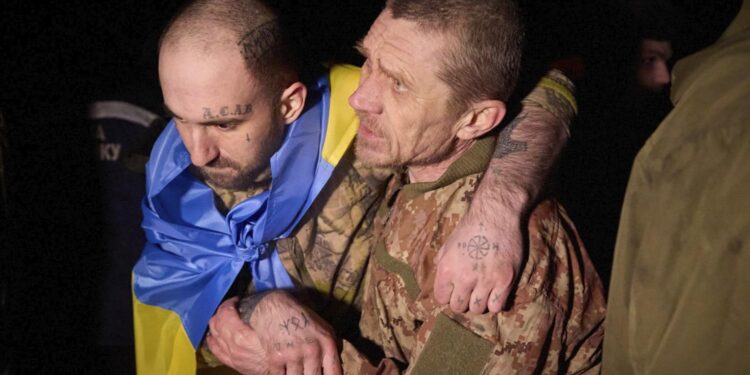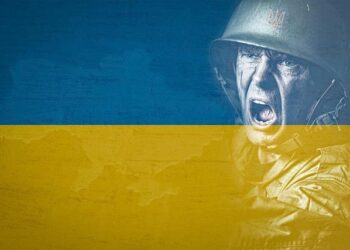After months of uncertainty, a Ukrainian family has been reunited with their son, a former prisoner of war whose ordeal has left deep physical and psychological scars. His return highlights the profound and lasting impact of captivity on soldiers, as well as the challenges faced by families striving to support their loved ones through recovery. This article explores the personal journey of trauma and resilience amidst the ongoing conflict in Ukraine.
Ukrainian Family Reunites With Son After Harrowing Captivity
After months of uncertainty and anguish, the Mironenko family finally embraced their son, Oleksandr, who had been held captive as a prisoner of war. The reunion, deeply emotional and fraught with silent pain, revealed the heavy toll that captivity had levied on the young soldier. Though physically unharmed, Oleksandr’s eyes reflected the psychological scars of his ordeal-memories of harsh interrogations and isolation that continue to haunt him. His parents, while relieved beyond measure, acknowledge that the journey toward healing will be long and complex.
Oleksandr’s recovery plan involves a combination of therapies and community support, highlighting the multifaceted approach needed to address trauma after war. Key elements include:
- Intensive psychological counseling sessions
- Regular medical evaluations to monitor post-traumatic symptoms
- Family therapy to rebuild trust and emotional connection
- Engagement in veteran support groups for shared experiences
| Support Type | Description |
|---|---|
| Psychological | Trauma-focused cognitive behavioral therapy |
| Medical | Neurological assessments and physical therapy |
| Social | Peer support groups and community integration |
| Family | Joint counseling sessions to foster healing |
Psychological Scars and the Hidden Battle Facing Returning Prisoners of War
Many returning prisoners of war grapple with invisible wounds that persist long after their release. These psychological scars manifest in myriad ways-ranging from post-traumatic stress disorder (PTSD) and severe anxiety to deep-rooted depression. For Ukrainian soldiers held captive under harrowing conditions, the ordeal often includes prolonged isolation, constant fear, and physical abuse, all of which contribute to a complex trauma that complicates reintegration into civilian life. Families, while relieved to see their loved ones return, frequently encounter a changed individual whose emotional and mental state is difficult to understand or manage.
Support systems, both formal and informal, are critical yet often inadequate. Key challenges faced in the post-release phase include:
- Social Detachment: Difficulty reconnecting with family and community due to altered emotional responses.
- Persistent Nightmares and Flashbacks: Traumatic memories intrude, disrupting sleep and daily functioning.
- Distrust and Hypervigilance: Heightened alertness that interferes with feelings of safety.
- Limited Access to Specialized Care: Scarcity of psychological services tailored to POW trauma.
| Symptom | Impact on Daily Life | Needed Support |
|---|---|---|
| PTSD | Intrusive memories, panic attacks | Therapy, medication |
| Depression | Loss of interest, isolation | Counseling, community support |
| Hypervigilance | Constant alertness, sleep disruption | Relaxation techniques, safe spaces |
Experts Urge Comprehensive Mental Health Support for Veterans and Their Families
As heroes return home from captivity, mental health specialists emphasize that recovery is far from a simple reunion. The psychological scars borne by veterans, especially those held as prisoners of war, often run deep and ripple through their families. Experts advocate for multifaceted care models that address not only post-traumatic stress disorder (PTSD) but also the secondary traumas experienced by spouses, children, and caregivers. These models must integrate long-term therapy, community support programs, and access to specialized psychiatric services to foster true healing.
Central to effective support is a collaborative framework involving medical professionals, social workers, and veteran organizations. This approach recognizes the complex needs of those altered by trauma and facilitates tailored interventions. The following table outlines key components recommended by experts for comprehensive veteran mental health support:
| Support Component | Purpose | Expected Outcome |
|---|---|---|
| Integrated Therapy | Address PTSD and related disorders | Improved emotional regulation |
| Family Counseling | Mitigate secondary trauma effects | Strengthened family dynamics |
| Community Outreach | Reduce isolation and stigma | Enhanced social reintegration |
| Peer Support Groups | Share lived experiences | Greater resilience and hope |
- Continuous Monitoring: Regular mental health evaluations to adjust care plans.
- Accessible Services: Removing bureaucratic barriers to treatment.
- Education Campaigns: Raising awareness about veteran trauma in communities.
To Conclude
As the family of the Ukrainian soldier begins to navigate the long road of recovery, their story underscores the profound and lasting impact of war on those who endure captivity. While his return marks a moment of relief and reunion, the challenges ahead highlight the urgent need for comprehensive support for former prisoners of war, whose battles often continue far beyond the battlefield. The resilience of families and communities will remain vital as Ukraine faces the ongoing human cost of conflict.
















